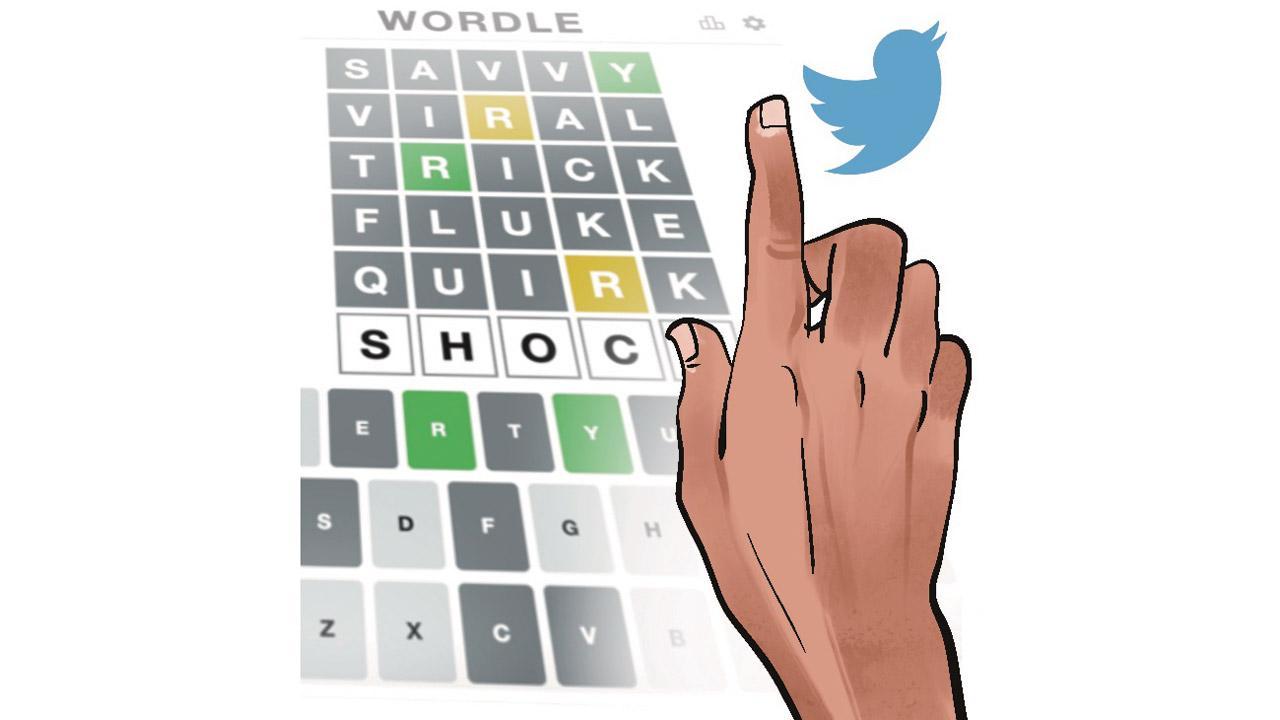Some of what makes Wordle popular is stuff sorely missing of late from mainstream culture

Illustration/Uday Mohite
![]() My favourite tweet of February may be, “bro, I thought things will look up in Feb but first thing in the morning Wordle bik gaya.” One reply went, “Westland bhi band ho gaya.” The exchange encapsulated something of what ails our cultural sphere (not a mystery five-letter word–capitalism).
My favourite tweet of February may be, “bro, I thought things will look up in Feb but first thing in the morning Wordle bik gaya.” One reply went, “Westland bhi band ho gaya.” The exchange encapsulated something of what ails our cultural sphere (not a mystery five-letter word–capitalism).
ADVERTISEMENT
Some of what makes Wordle popular is stuff sorely missing of late from mainstream culture.
First, Wordle was made for love. Josh Wardle, its inventor, made it for his partner who loves word games. This is not something we can say for most films, web series or even the books we are manipulated into consuming by marketing —or social prestige’s—version of love-bombing.
Wordle’s main purpose is fun. In six tries you must guess a mystery word–usually you can, because it’s a commonplace word. In fact, if you try uncommon words, you end up needing more tries. There’s just the right combination of luck and skill—your first guess is completely random and thereon its elimination and knowing how English spellings work. Within the world of English speakers, this makes the game relatively inclusive. There’s no culturally inflected knowledge or snobbery involved.
Unlike the Internet’s pornographic push to keep moving to the next thing in search of a climactic satiety which never arrives, offering you sensations that leave you feeling empty and thus constantly reaching for more, Wordle is just once a day. It sends you no notifications of fake intimacy. It does not call you part of its ‘fam’ or say “hey Paromita, we’ve been missing you” yaniki your credit card pin, or give dire warnings like “your profile is about to be hidden”.
Initially I confess that I did follow one of those people who owns the complete works of Pink Floyd (a complaint for another time) to a site where you can play unlimited games.
But I soon felt that familiar sick feeling, the tension and fidgety dullness, of consuming meaningless things, eating without being appetite. In a way the few minutes of Wordle time are a fleeting glimpse of what being online but not hostage to social media might be like.
But, of course, it is social media that made Wordle viral. Wordle unifies its two million users in a common experience —one word (which beats being unified by the Coronavirus right?). You can also share not just your scores, but your play-journey thus sharing the experience with other players and tasting the casual fun of the playground. Recently, I guessed the word on first try and went through the day entertained by the mock-disgust and disgruntled envy, the joshing and play-competitiveness that ensued.
Score-sharers do have haters. Fatima Bhutto recently tweeted, “no one cares about your wordle score.” Okay sister, aur bhi sukh hain zamane mein we know, but just saying ki an 80-year-old Chicago woman imprisoned at home by an intruder, was saved because her daughter, in Seattle, got worried when her mother did not post her Wordle score at her customary time.
But trouble has arrived in paradise. Now the New York Times has bought Wordle, the pyaar chahiye ki paisa chahiye feeling of betrayal is being channeled through a proxy battle yaniki English versus American spellings backlash. Guess we’ll have to keep our sense of humour, sorry, humor, and play till we can.
Paromita Vohra is an award-winning Mumbai-based filmmaker, writer and curator working with fiction and non-fiction. Reach her at [email protected]
 Subscribe today by clicking the link and stay updated with the latest news!" Click here!
Subscribe today by clicking the link and stay updated with the latest news!" Click here!







